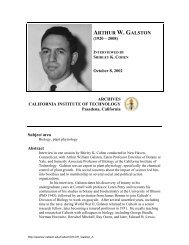Interview with Thomas A. Tombrello - Caltech Oral Histories
Interview with Thomas A. Tombrello - Caltech Oral Histories
Interview with Thomas A. Tombrello - Caltech Oral Histories
Create successful ePaper yourself
Turn your PDF publications into a flip-book with our unique Google optimized e-Paper software.
<strong>Tombrello</strong>–103<br />
Six months later, “OK, Bob. Did you have fun?” “Oh, yeah, smart guy. We worked on this,<br />
this, and this.” I say, “Wow, that’s great stuff. How would you compare him to this other guy<br />
you’re working <strong>with</strong>?” “Oh, he’s not in the same league,” I’d get him to explain that. “Very<br />
good, Bob, thank you. I’ll give you another assignment soon.” I’d bring Jorge in and say,<br />
“Look, Jorge, no one’s going to fire you. But my projection is, you are not going to be promoted<br />
to the next level of scientist. You’re not going to become a senior scientist.” There’d be the<br />
usual—<br />
ASPATURIAN: Angst.<br />
TOMBRELLO: Yes, but nothing dramatic. In the case of Jorge, he said, “OK, I understand what<br />
you’re saying. You’re saying I’ve got a future here, but it’s a limited future.” He said, “Let me<br />
think about it, because I may come in <strong>with</strong> a proposal.” The proposal he came in <strong>with</strong> was, “I’m<br />
going to take a sabbatical. I’ve found a place in South America that would like me to come for a<br />
year. Would you pay for it?” I said, “Under what conditions?” And he says, “If it works, I’m<br />
not coming back.” I said, “It’s a deal.” And so I adopted my own tenure-review system. I used<br />
Mr. Bob Burridge and a couple of others as my test committee. It’s not that any of these people<br />
were bad. It’s just that I felt that I had to keep trading up, and I had to have a way of moving<br />
people out of the lab if they hit a plateau that I didn’t think they could get over. I could have<br />
been wrong about it. People do restart themselves. There were some people I tried to restart,<br />
sometimes successfully. But universities do have certain strategies that industry does not always<br />
understand. It’s different from a university, but there are things that transfer, particularly to a<br />
research lab. If you’re out there in the field, I guess it’s the same thing. It’s a different set of<br />
talents, but there are people who are going to make the grade, people who are someday going to<br />
be candidates for chairmen. Our chairman, Euan Baird, though he was a Cambridge grad, had<br />
been out in the field, out in the Middle East, and earned his spurs. Not only was he smart about a<br />
lot of things in science, he had actually been out there dealing <strong>with</strong> the real world.<br />
People are people. It’s just that you’re evaluating different skills and different talents.<br />
The last thing you want is an organization where everybody looks alike. You want a diversity of<br />
intellectual approaches to tough problems, because you never know what you’re going to run<br />
into.<br />
http://resolver.caltech.edu/<strong>Caltech</strong>OH:OH_<strong>Tombrello</strong>_T

















